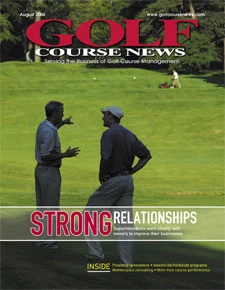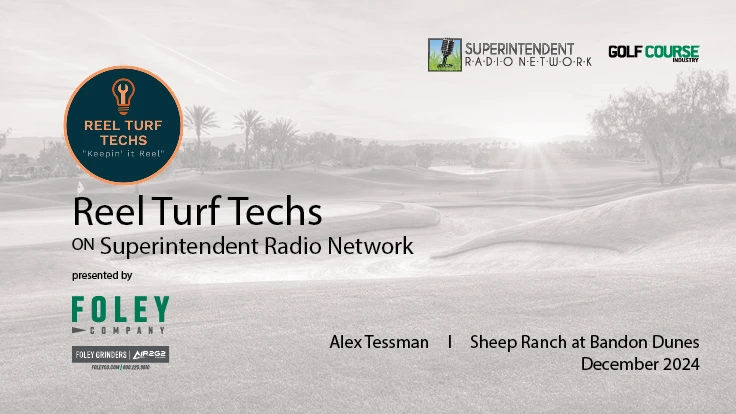For years, I’ve been telling people, “Golf course superintendents are like folks from Missouri – they always say ‘show me.’”
Got a new biostimulant potion? Show me the research. A new piece of equipment? Show me a demo. Some “revolutionary” new technique? Show me who else has tried it.
Well, I’m not from Missouri, and I don’t grow grass for a living, but 20 years of hanging out with you guys – plus the inherent cynicism that comes with being a journalist – also has made me a pretty tough sell for most things. The words, “I doubt it,” often pop into my head or jump out of my piehole.
I’m particularly skeptical when a headline in the morning paper or on CNN screams a “new study” shows some particular substance we eat, drink or come in contact with regularly will probably kill us.
Sometimes it’s bizarre (“New study links Buicks and hyperactivity”). Sometimes it’s an incredibly obvious waste of taxpayer’s grant money (“Research shows teenagers likely to experiment with sex”). It always reminds me of the old Chevy Chase gag on “Saturday Night Live’s” Weekend Update segment where he says, “Scientists today announced that saliva causes cancer … but only when swallowed in small amounts over a long period of time.”
We can thank the marvelous field of epidemiology for most of these horror stories. Epidemiology is basically bookmaking for human health. For example, if you eat tofu exclusively at every meal, every day, the odds are you’ll live 3.2 years longer than average. (I just made that up … tofu really sucks ... don’t eat it.)
Living your life based on this type of “science” is like throwing five bucks into a Final Four pool at work, only the odds are usually fuzzier than the 50-to-1 you might get if you pick Gonzaga to win it all. Also, I know if I place a bet with my bookie and win, he’ll pay me. If I lose, I pay him. Epidemiologists bet with our tax money and get paid for it whether they’re right or wrong.
It’s my humble opinion many epidemiologists follow this tried-and-true scientific protocol: Decide what attention-getting notion you want to prove, and then figure out a way to maybe prove it. Next, publish the results in some obscure academic journal and hire a really good public relations agent to get you on TV and, of course, promote your new book.
Completely cynical? Yes. Completely wrong? I doubt it.
One month, coffee is horrible for you. The next, it’s a lifesaver. Ditto for red wine, apple juice, PVC pipes, cell phones, eggs, estrogen, ethanol, chocolate, red meat, aspirin, Advil, etc. And now, when technology allows Dr. Dogooder of Whatsamatta U. to detect these nasty things within our bodies in parts per trillion, the number of “Scare the crap out of people” reports increases daily.
That said, here are a few things I doubt automatically when I read or hear about them:
Cancer clusters: Serious scientists – including those from the National Cancer Institute – have long dismissed the idea that isolated environmental factors cause acute outbursts of disease. Five cases of leukemia in the same zip code? It couldn’t just be chance, so it must be the local paint factory. Unfortunately, victims often need something or someone to blame besides genetics or sheer bad luck. It’s always easier – and often more lucrative for the lawyers – to point a finger at an industry.
Food safety: Thanks to the scaremongers, there are people who worry about the microscopic contents of every bite they eat. Gosh, does this steak have cattle hormones in it? Could this tomato have been genetically modified? Here’s a fact: We have the safest food supply in the world. Go to Ghana or Bangladesh if you really want “organic” products.
Global warming: Anything that gets Al Gore so excited automatically makes my B.S. meter jump off the scale.
Child abductions/abuse: Do you really believe there’s been an “epidemic” of child abductions and child abuse during the past two decades, or do you agree that we’ve just gotten a lot better at reporting and record-keeping?
Internet identity theft: If you’re really old like me, you probably remember when you used to leave a “carbon” copy of credit card receipts (with the complete numbers and signatures) sitting on a table at a restaurant. Think that was less risky than buying something on a Web site with your Amex?
Bird flu: I’m dating myself, but I remember the “Swine flu” scare in the ’70s. You younger folks might recall the SARS flap a couple of years ago. Potential epidemics sell newspapers and generate research grants. Period.
Pesticides: OK, you knew I was going to get to this eventually. During 20 years of working in this business, I’m not sure I’ve read even one “science-based” article about pesticides in a mainstream publication that was completely accurate. No matter how discredited, the same bad arguments and lousy studies surface every time a reporter decides to do a piece about pesticides used on lawns or golf courses.
With a few exceptions (John Stossel of ABC News, writer Michael Fumento, etc.), journalists are happy to do a quick Google search, grab some fiction from the Beyond Pesticides Web site or some other activist group and repeat the same junk that’s been plaguing us for years.
Will reporters ever be more accurate when it comes to pesticides? I doubt it. It’s easier to scare the daylights out of people than to do the research and tell the truth. I don’t think the media are antipesticide, they’re mostly just lazy.
Being skeptical about the “latest research” about anything from global warming to bird flu to pesticide exposure is healthy. Every one of these studies is funded, conducted and promoted by someone with an agenda. Sometimes it’s to receive more grant money for the next big study. Other times (such as with pesticides), the agenda is to force their views on the general public without regard to the science that supports the safety of the products. Activists honestly believe extremism – and even disinformation – in pursuit of their goals is no vice. That’s morally reprehensible.
It’s possible GCN might receive tons of letters and e-mails saying I’m right about skepticism. It’s also possible you might write to say you disagree with me and tell me I’m just a grumpy, cynical old bastard and I’m wrong. But, you know what … I doubt it. GCN

Explore the August 2006 Issue
Check out more from this issue and find your next story to read.
Latest from Golf Course Industry
- Advanced Turf Solutions and The Aquatrols Company release soil surfactant
- Heritage Golf Group acquires North Carolina courses
- Editor’s notebook: Green Start Academy 2024
- USGA focuses on inclusion, sustainability in 2024
- Greens with Envy 65: Carolina on our mind
- Five Iron Golf expands into Minnesota
- Global sports group 54 invests in Turfgrass
- Hawaii's Mauna Kea Golf Course announces reopening





